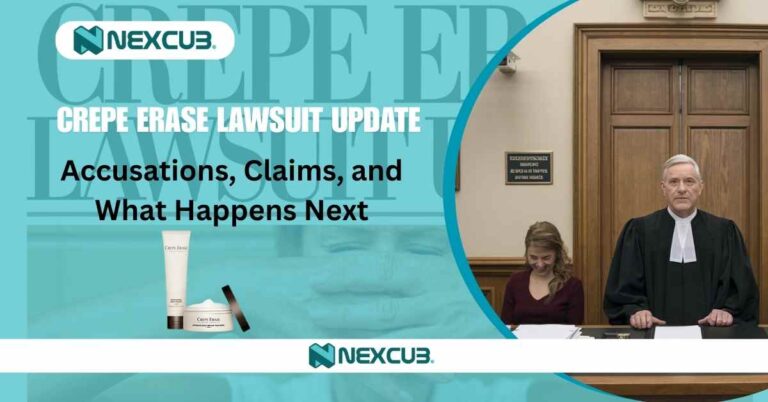Our Location
304 North Cardinal St.
Dorchester Center, MA 02124

The Crepe Erase lawsuit is making headlines due to claims of false advertising and product ineffectiveness. Customers say the product failed to reduce wrinkles and caused skin irritation. This legal case has sparked concern among users and the skincare industry.
Many users of Crepe Erase feel misled by its anti-aging promises. Complaints include poor results, skin irritation, and hidden subscription fees. Stay tuned as we uncover the latest updates on this ongoing legal battle.
Crepe Erase is a skincare product designed to reduce crepey, wrinkled skin. It claims to tighten, smooth, and rejuvenate aging skin. The key ingredient, TruFirm Complex, is made from plant-based extracts.
The Crepe Erase lawsuit centers on claims of false advertising and product ineffectiveness. Users say it didn’t reduce wrinkles as promised and caused skin irritation. This has led to growing concerns and ongoing legal action against the brand.

Customers accuse Crepe Erase of making false promises about its anti-aging results. Many users say it failed to reduce wrinkles or improve crepey skin. The brand’s marketing is seen as misleading and deceptive. These claims are a major part of the ongoing lawsuit.
Some users reported skin irritation and allergic reactions after using Crepe Erase. Complaints suggest the company failed to warn about possible side effects. This raised questions about product safety and transparency. These issues are key points in the lawsuit against the brand.
The lawsuit was filed after many customers voiced dissatisfaction with Crepe Erase’s claims of reducing wrinkles and crepey skin. The company faced accusations of misleading marketing, with some customers saying the product didn’t live up to expectations.
Legal action was taken to challenge these false promises and seek justice for consumers. The plaintiffs argue that Crepe Erase’s claims were not supported by adequate scientific evidence.
Court hearings have taken place to review the evidence submitted by both parties, including consumer testimonials and expert opinions. The plaintiffs have shared their experiences of not seeing the promised results and the irritation caused by the product.
Crepe Erase’s legal team has presented defenses, arguing that results can vary from person to person. The discovery phase has helped both sides prepare for the trial, gathering essential documents and statements.
The lawsuit is still ongoing, with no final decision or settlement yet reached. If the plaintiffs succeed, they may receive compensation or refunds for the alleged false claims and side effects.
The case could also lead to stricter regulations for skincare marketing, especially regarding product effectiveness claims. The outcome of this case could set a precedent for future lawsuits in the beauty and skincare industry.
RAED: Blind Frog Ranch Lawsuit Update 2024
Many customers reported that Crepe Erase didn’t work as advertised. Despite using the product consistently, they saw little to no improvement in their skin. This led to frustration and disappointment, as the product didn’t meet their expectations.
Apart from ineffective results, some users experienced skin irritation after using the product. Many also complained about the difficulty of canceling subscriptions, which led to unwanted shipments. These issues added to the negative experience for some customers.
Crepe Erase has denied the allegations in the lawsuit. The company insists its product claims are truthful and that results may vary from person to person. They argue that their advertising is in line with industry standards.
The company stands by its product’s effectiveness, stating that many users have experienced positive results. Crepe Erase emphasizes that while some may not see dramatic changes, the product does provide benefits to many others.
To address customer concerns, Crepe Erase may update its advertising and product information. They could provide clearer details on expected results and possible side effects to restore trust. These changes would aim to improve transparency and customer satisfaction.

The lawsuit has caused some concern among both current and potential users. Many may hesitate to try Crepe Erase due to the legal issues and mixed reviews. This could impact the brand’s reputation and sales moving forward.
Users should carefully monitor their skin for any reactions when using Crepe Erase. Keeping track of results and any side effects can help in case of future complaints or claims. It’s also wise to research products thoroughly before committing to use.
The Crepe Erase lawsuit highlights the importance of honest advertising in the skincare industry. Brands must ensure their claims are backed by solid evidence to avoid misleading consumers. This case stresses the need for transparency in marketing practices.
This lawsuit could lead to stricter regulations for skincare brands. Companies may be required to provide more detailed information about product effectiveness and potential risks. These changes would help protect consumers and ensure fair marketing practices.
Crepe Erase may provide temporary improvements in skin texture, but results vary from person to person. Some users report minor tightening, while others see little effect.
Some products can help improve skin appearance, but they often offer short-term results. The effectiveness of these products depends on skin type and individual factors.
Yes, there are other crepey skin products that target skin elasticity, like StriVectin or Nivea Q10. These products also claim to smooth and tighten skin.
Crepe Erase may help hydrate and firm the skin on the neck, but it may not provide dramatic long-term results. Many users find some improvement, but it varies.
The Crepe Erase lawsuit centers around false advertising and safety concerns, with customers claiming the product failed to deliver promised results. Consumers also reported skin irritation and difficulty canceling subscriptions. The case is ongoing, with both sides presenting evidence. It could lead to stricter regulations in the skincare industry if the claims are upheld.